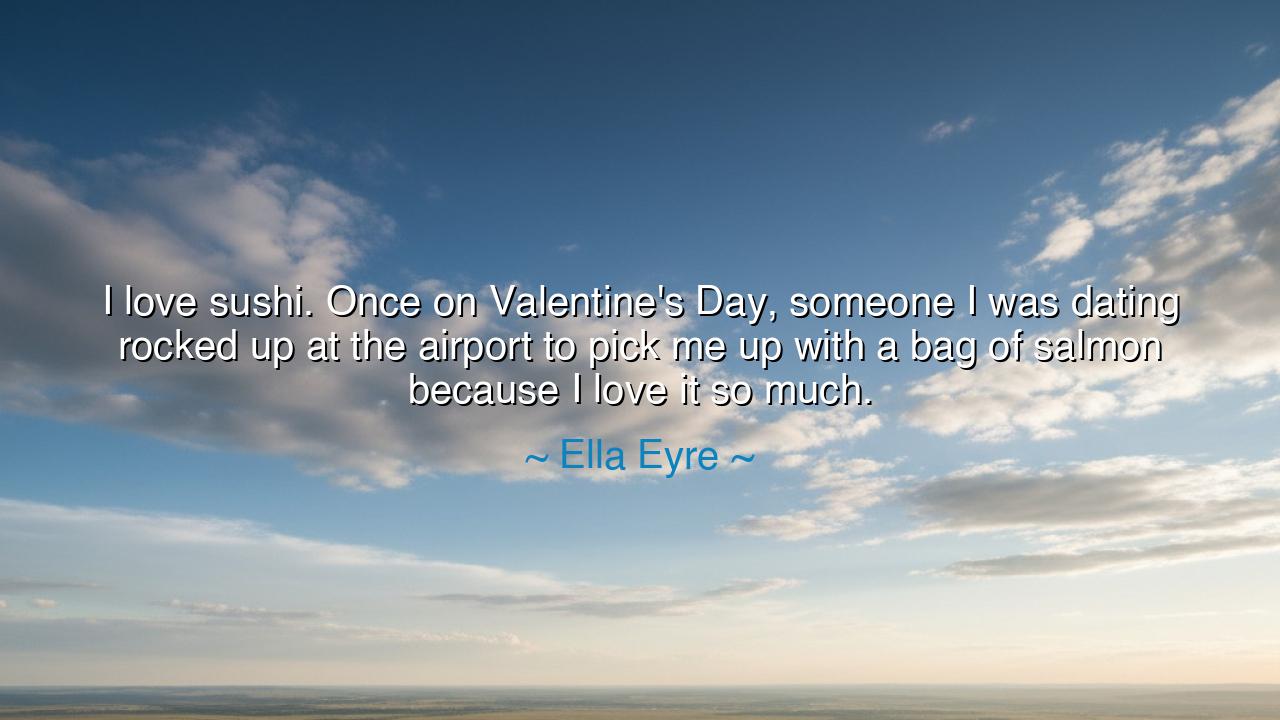
I love sushi. Once on Valentine's Day, someone I was dating
I love sushi. Once on Valentine's Day, someone I was dating rocked up at the airport to pick me up with a bag of salmon because I love it so much.






In a bright, playful confession, the singer gives us a parable of devotion in ordinary clothes: “I love sushi. Once on Valentine’s Day, someone I was dating rocked up at the airport to pick me up with a bag of salmon because I love it so much.” Hear the deep bell under the laughter. Love, when it is wise, studies the beloved’s hunger and meets it simply. It does not always arrive with roses or orchestras; it arrives with what nourishes—sometimes chilled fish wrapped in brown paper, held like a small treasure against the chest of someone who hurried through sliding doors.
The ancients would nod at this. In their telling, affection is proved not by spectacle but by precision. To know a person is to know their bread—what steadies their spirit and sweetens their day. The bag of salmon becomes a token more eloquent than jewels, because it speaks a specific dialect: I listened; I remembered; I came prepared to gladden you. In that moment, the airport—a place of separations and returns—turns temple, and the gift consecrates the floor between two travelers.
Notice the gentle reversal of custom. On Valentine’s Day, ritual urges us toward grand gestures, red petals, and declarations large enough to echo. Yet the tale says: choose the right small thing. A parcel of salmon for a lover who adores sushi is the quiet triumph of attention over cliché. The beloved does not need the world to applaud; the beloved needs to feel seen. In such moments, love discards its mask and becomes craftsmanship—measurement, timing, and a bit of delicious nerve.
History keeps a cupboard full of similar truths. When the tea master Sen no Rikyū prepared a ceremony for his lord, he did not dazzle with gold; he perfected the placement of a bamboo ladle and the steam rising from a simple bowl. The lord came, drank, and felt his mind clarified, because every detail had been tuned to his presence. So, too, the lover at the airport: no banquet hall, no trumpets—only the exact delight offered at the exact hour, and therefore unforgettable.
There is also an ethic hidden in the humor: love walks the errand itself. It rocks up—arrives in person, bearing the weight of the bag and the warmth of the smile. Many gifts can be outsourced; attention cannot. The act says, I left my own path to meet you on yours. In a world of couriered affections, the carried offering regains its ancient power. The dating bond grows roots not from theory but from these errands of the heart, repeated until trust becomes weather.
From this, the meaning rises clear as winter air: to love well is to turn knowledge into nourishment. To say I love it so much is to hand the map to anyone brave enough to travel by it. The lover who hears this and answers with salmon has chosen wisdom over display, presence over performance. And this is how feasts begin in small kitchens, how songs are born in quiet cars, how home is found in the middle of a concourse that belongs to no one.
Take the lesson and carry it into your own keeping. First, listen for the precise hunger of those you cherish—food, rest, a story, a walk—and meet it without fanfare. Second, trade grandeur for fit: on Valentine’s Day or any day, select the gift that proves you paid attention. Third, deliver it yourself when you can; let your feet preach what your words promise. Finally, make your love practical—pack the snack, warm the coat, send the line that eases the landing. Do these, and your affection will be as sturdy as bread and as bright as sushi—a simple thing arranged with care, a modest offering that tastes, to the one who receives it, like joy.






AAdministratorAdministrator
Welcome, honored guests. Please leave a comment, we will respond soon